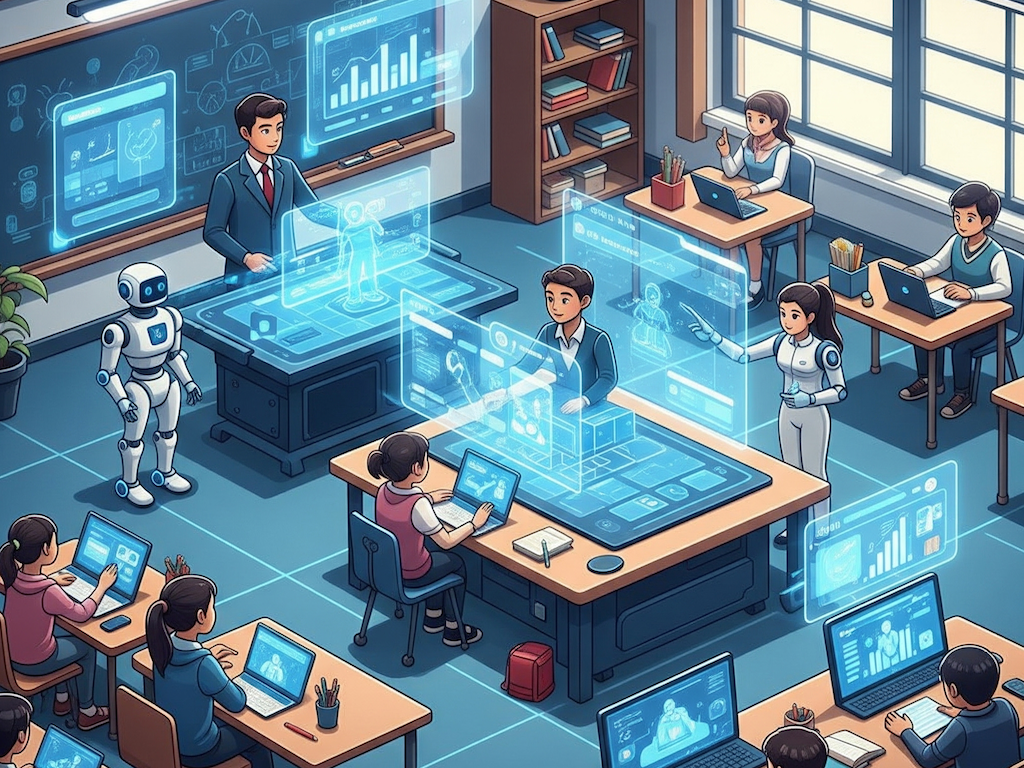
Rethinking Education in the Age of AI
Artificial Intelligence is reshaping the way we live, work—and learn. As AI becomes more accessible and capable, it challenges long-standing assumptions about how education is delivered, who has access to it, and what it means to be “educated.” With near-instant access to high school and college-level material, we are approaching a future where personalized, affordable, and effective learning can be available to anyone, anywhere.
The Shift from Group-Based to Individualized Learning
Traditional education systems have long operated on a one-size-fits-all model, structured around age-based cohorts and standardized pacing. While efficient for institutions, this model often leaves behind students who learn differently or at a different pace.
AI offers a radical alternative: education tailored to each individual. Intelligent tutoring systems can assess a learner’s strengths, weaknesses, and interests, and deliver just-in-time feedback and adaptive challenges. What once required a human tutor is now possible through AI-powered tools—scalable, tireless, and available 24/7.
This model represents a return to the most effective form of learning: one-on-one instruction. With AI, every student could have access to a personal tutor that adjusts to their learning pace and style, creating a path toward mastery rather than mere completion.
Unlocking Access for Underserved Communities
Perhaps the most promising impact of AI in education is its ability to democratize access. High-quality instruction is no longer limited to elite institutions or expensive private tutors. Students in remote, rural, or low-income communities can gain access to the same knowledge as those in top-tier schools—if not the same traditional credentials.
By lowering the cost of delivering personalized education, AI can help close long-standing equity gaps. It empowers students who may have been left behind by the traditional system and allows them to learn at their own pace, in their own environment.
Redefining Credentials: Beyond the College Degree
In this emerging model, the college degree may no longer be the sole indicator of a person’s expertise or potential. Alternative accreditation programs like CLEP (College-Level Examination Program), AP exams, and emerging competency-based credentials already recognize individual learning achievements, regardless of where or how the knowledge was acquired.
With AI-supported education, a learner can study independently, master college-level material, and then demonstrate their proficiency through assessments. This shift places greater emphasis on actual understanding and skills rather than time spent in a classroom.
We are moving toward a future where what you know—and can prove—matters more than where you learned it. This will likely have a transformative effect on hiring, professional development, and lifelong learning.
Knowledge for All: A Public Good
To be clear, this perspective does not disregard the value of group work, in-person collaboration, or the broader college experience. There are unique benefits to learning alongside others, engaging in dialogue, and building relationships that extend beyond the classroom.
However, the core opportunity is this: knowledge itself—especially foundational academic knowledge—should be accessible to the general public at low or no cost. AI makes it possible to separate knowledge acquisition from institutional constraints, giving more people a fair chance to learn, grow, and contribute meaningfully to society.
Motivation and Curiosity: The New Prerequisites
As education becomes more accessible and flexible, two new prerequisites emerge: motivation and curiosity. In a world where knowledge is always within reach, the desire to learn becomes the primary driver of success.
AI can spark that motivation by making learning engaging, relevant, and interactive. Gamified lessons, real-time feedback, and personalized encouragement can sustain learners through challenging material. But the responsibility ultimately rests with the learner: interest and self-direction become the foundation of achievement.
Collective Impact: Lifting Society as a Whole
When access to education is no longer restricted by cost, geography, or institutional gatekeeping, the collective intelligence of a society can rise. More people with more knowledge means better ideas, more innovation, and stronger communities. AI-fueled learning creates the conditions for lifelong growth—not just for individuals, but for entire populations.
This isn’t a distant dream. The tools already exist. From platforms like Khan Academy’s AI tutor to adaptive learning systems like Coursera and Saylor Academy, the infrastructure is forming. The challenge ahead lies in making these tools available to everyone and fostering the culture of curiosity and self-learning that drives progress.
Conclusion
The age of AI presents a profound opportunity to rethink how we educate ourselves and one another. Personalized, low-cost, high-quality learning is no longer science fiction—it’s becoming reality. The path forward will depend not just on technology, but on our willingness to embrace a new mindset: one where learning is continuous, credentials are flexible, and every individual has the power to learn at their own pace. In this future, education is not about where you go, but how far you're willing to grow.